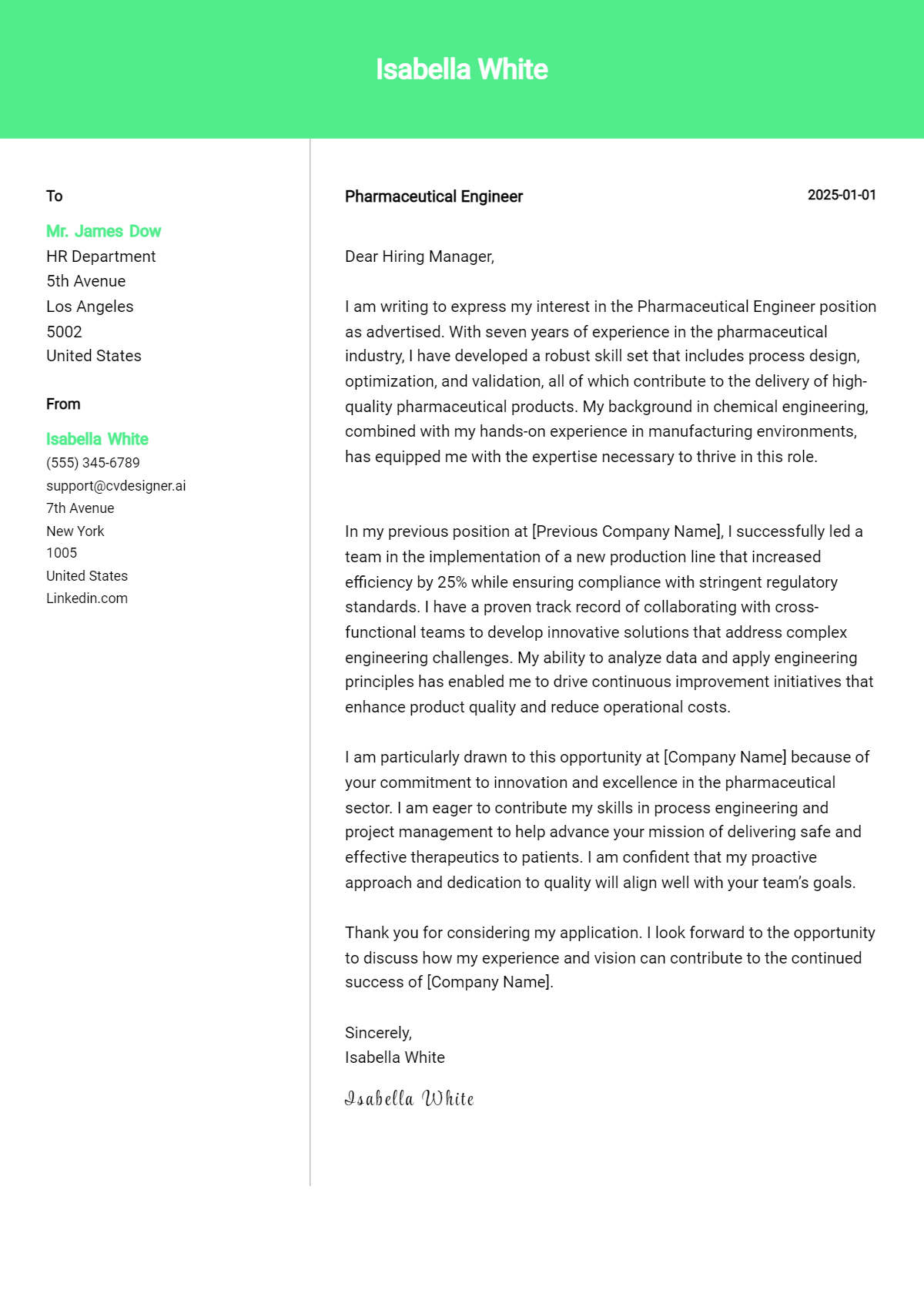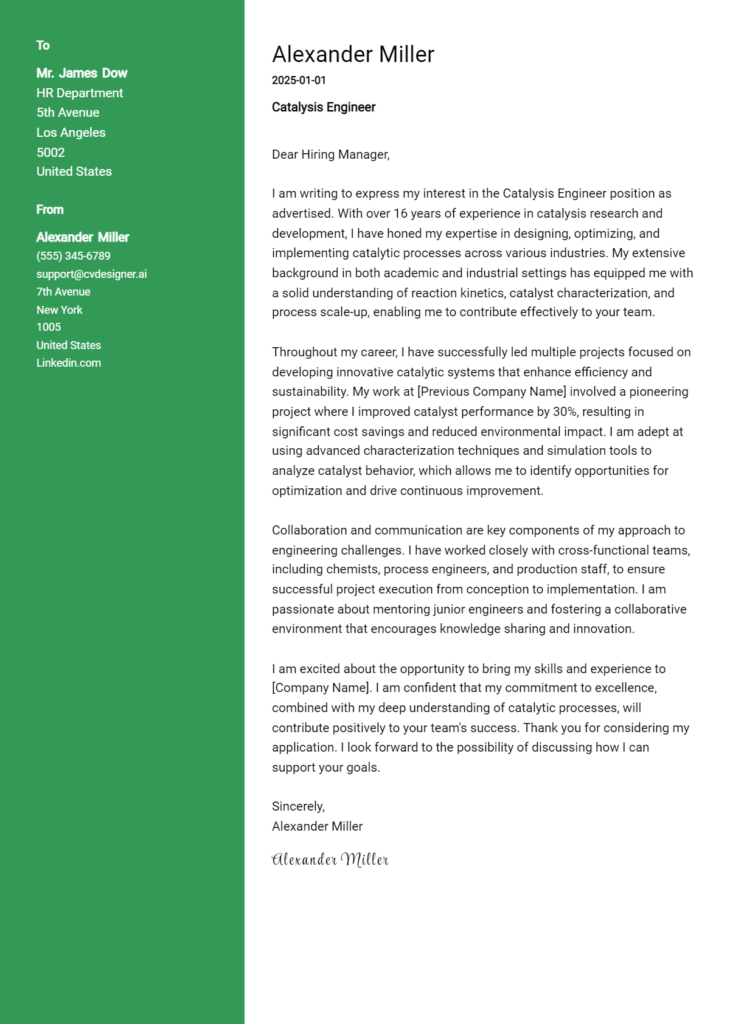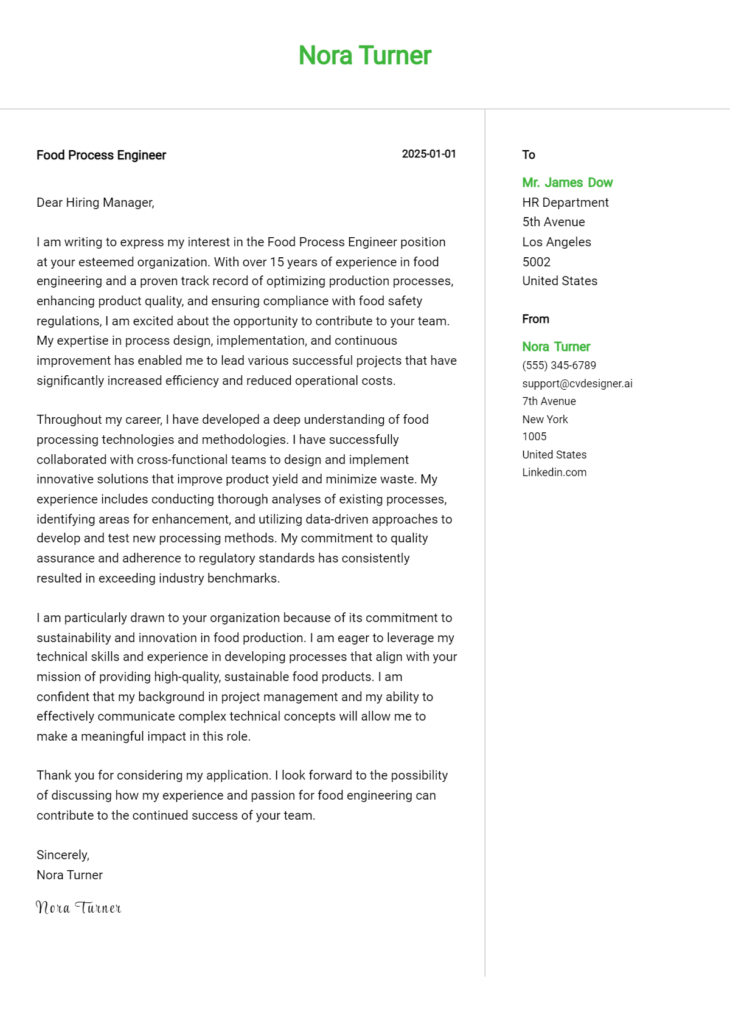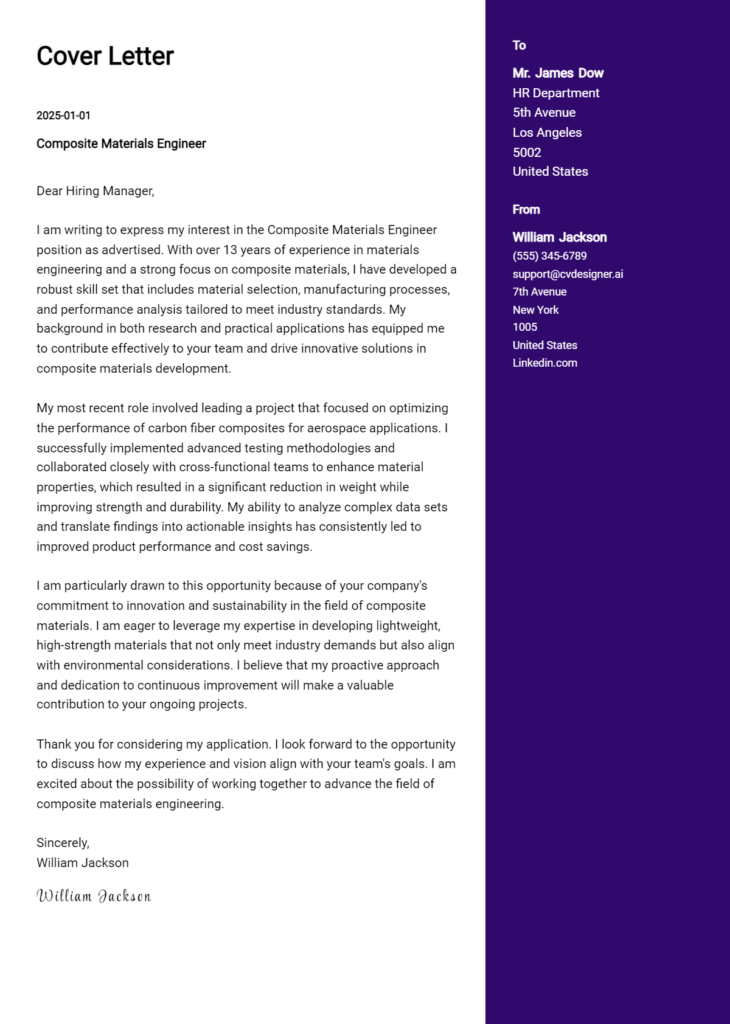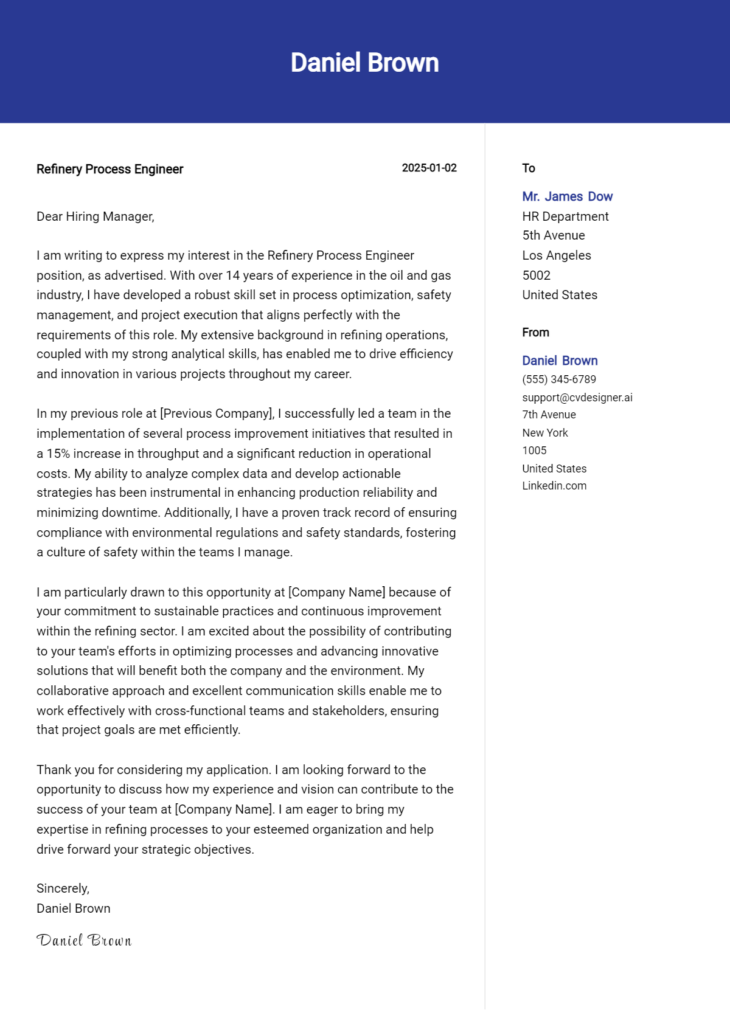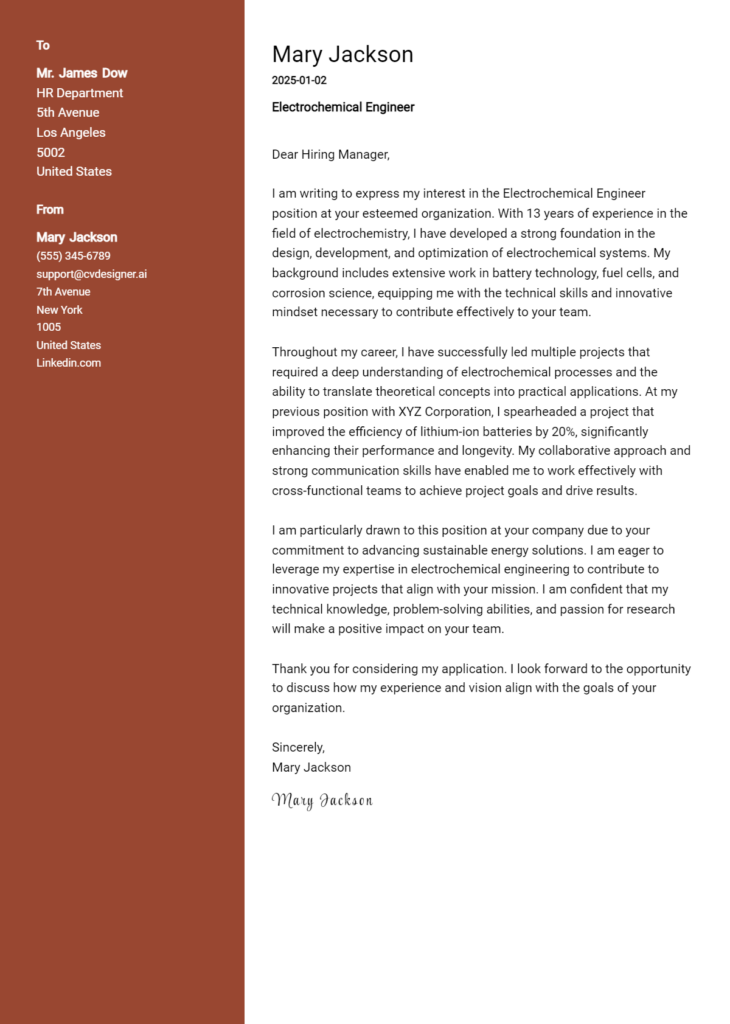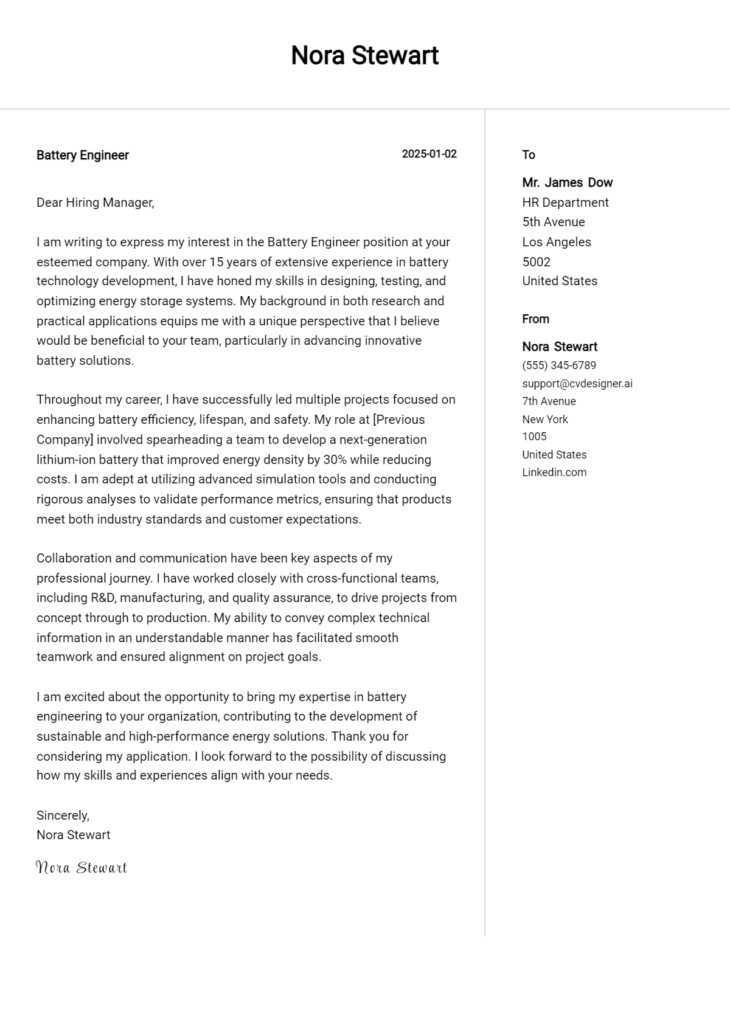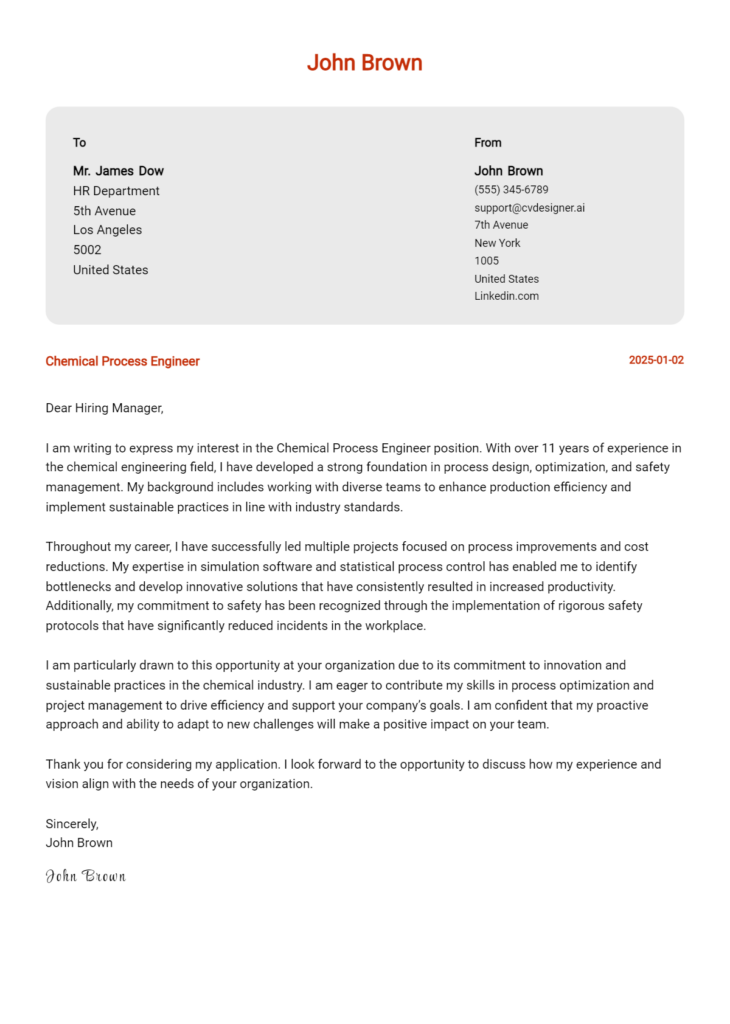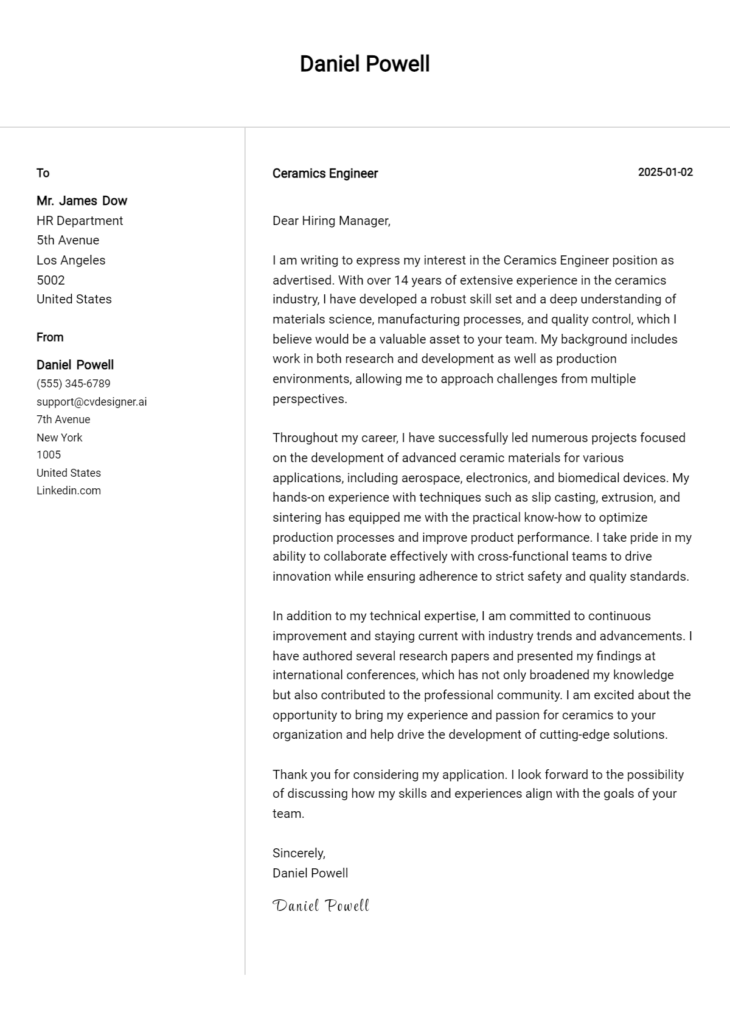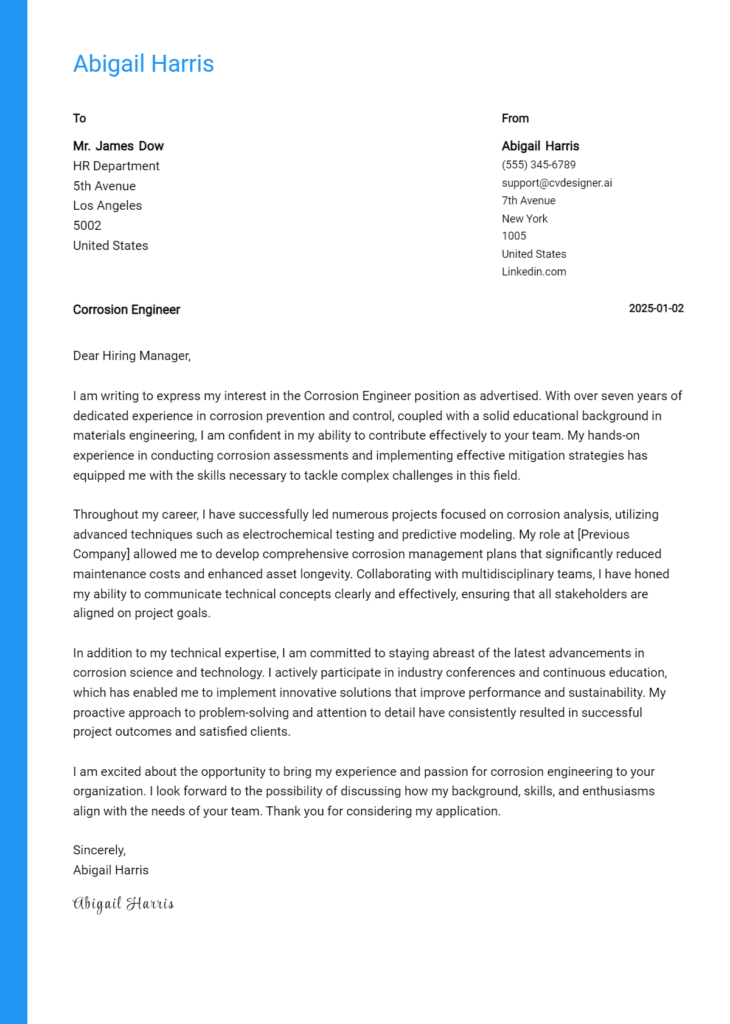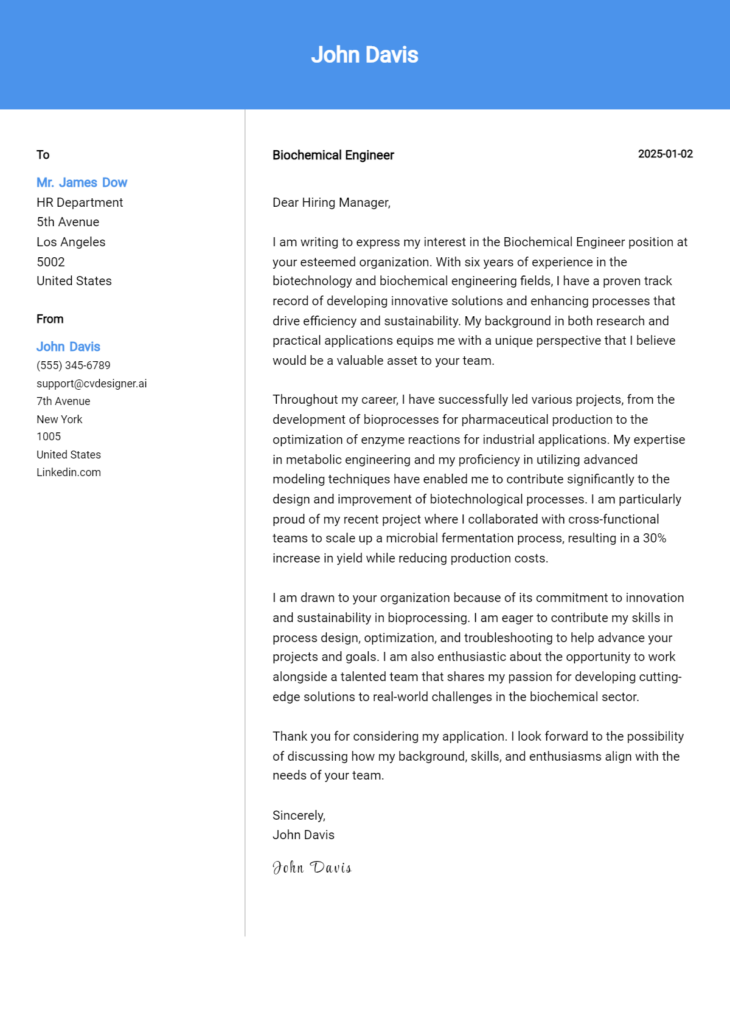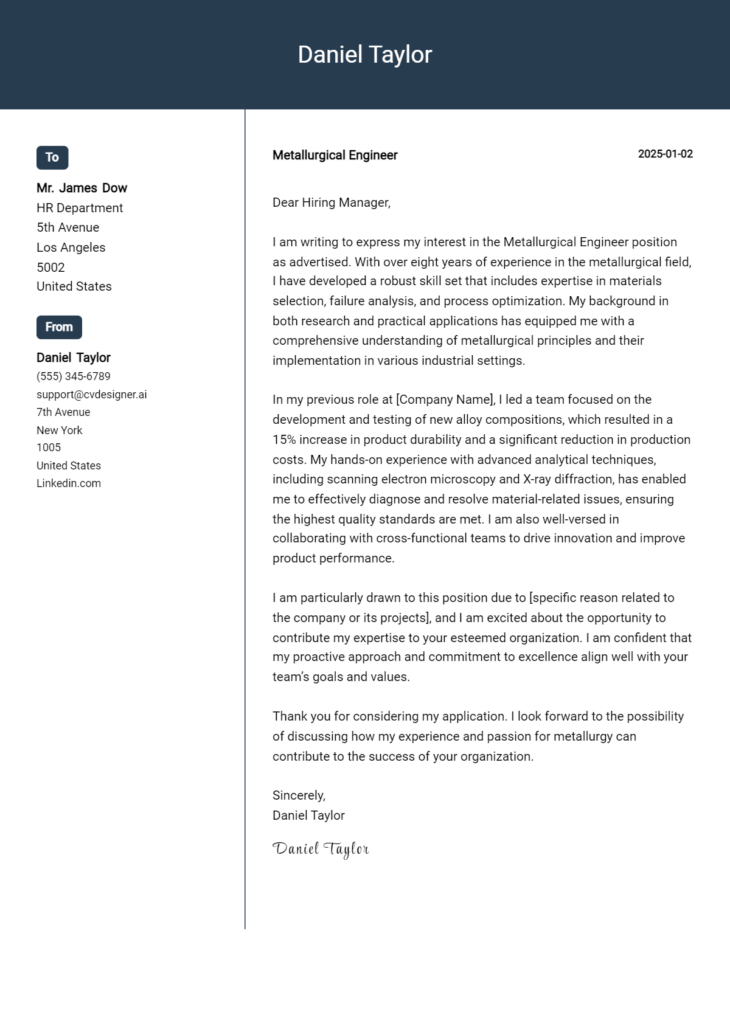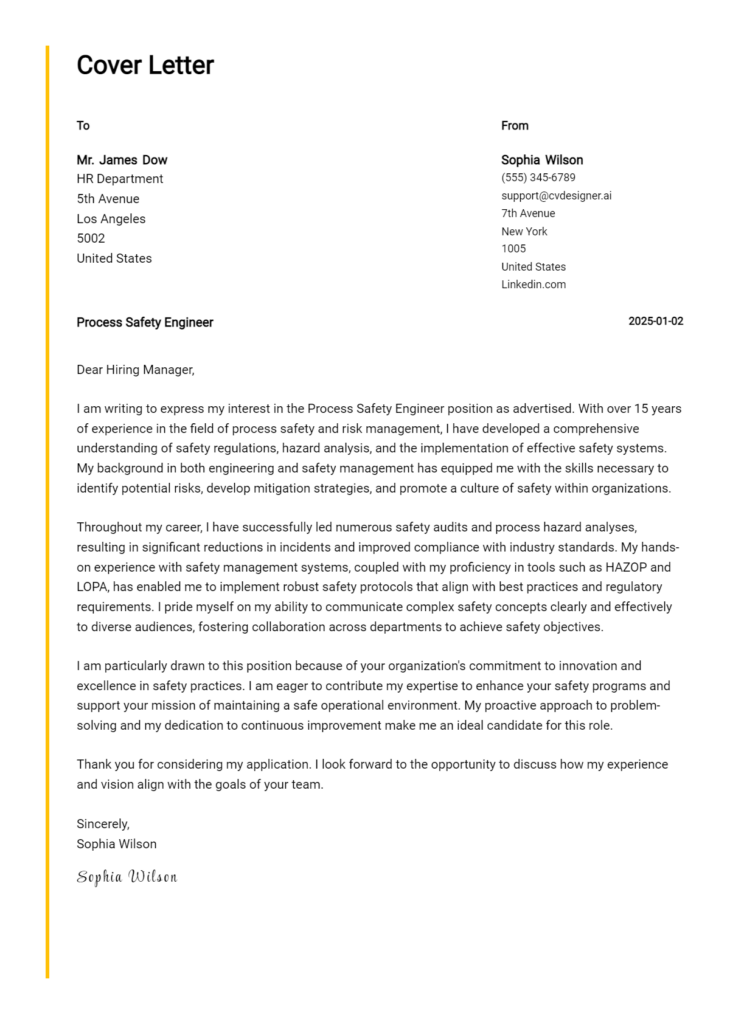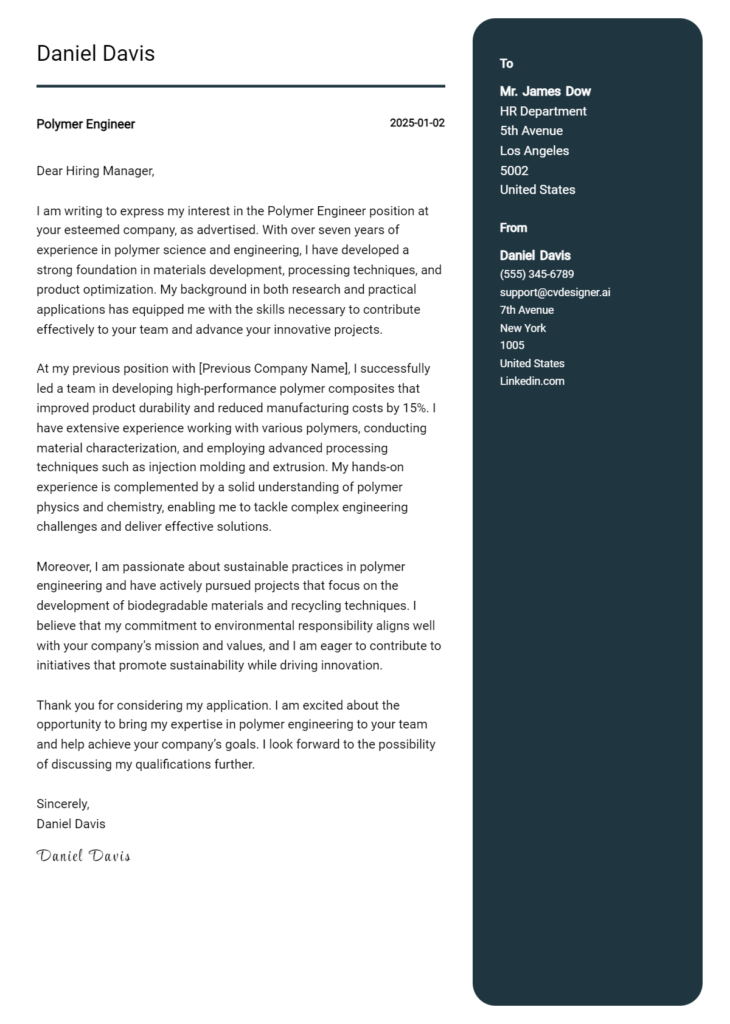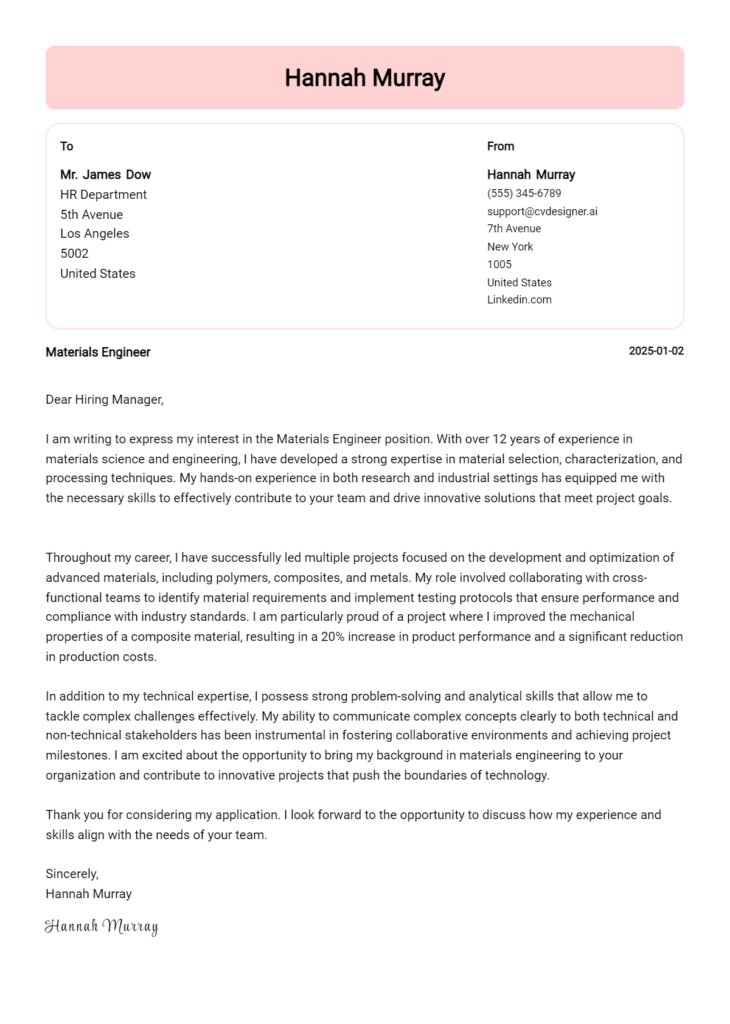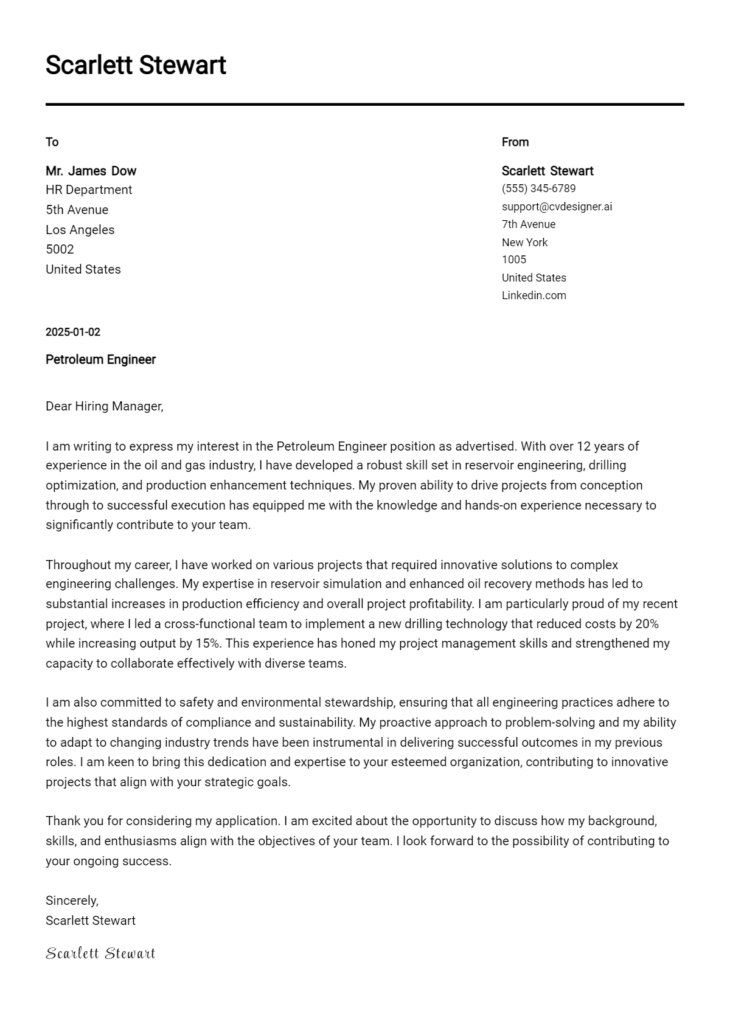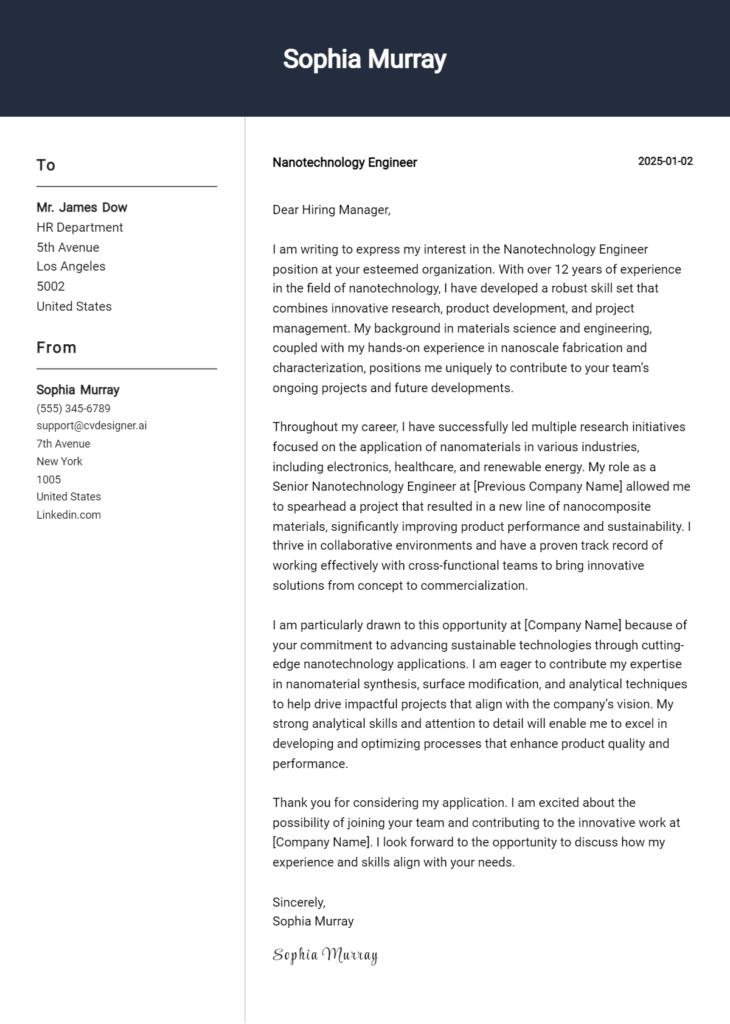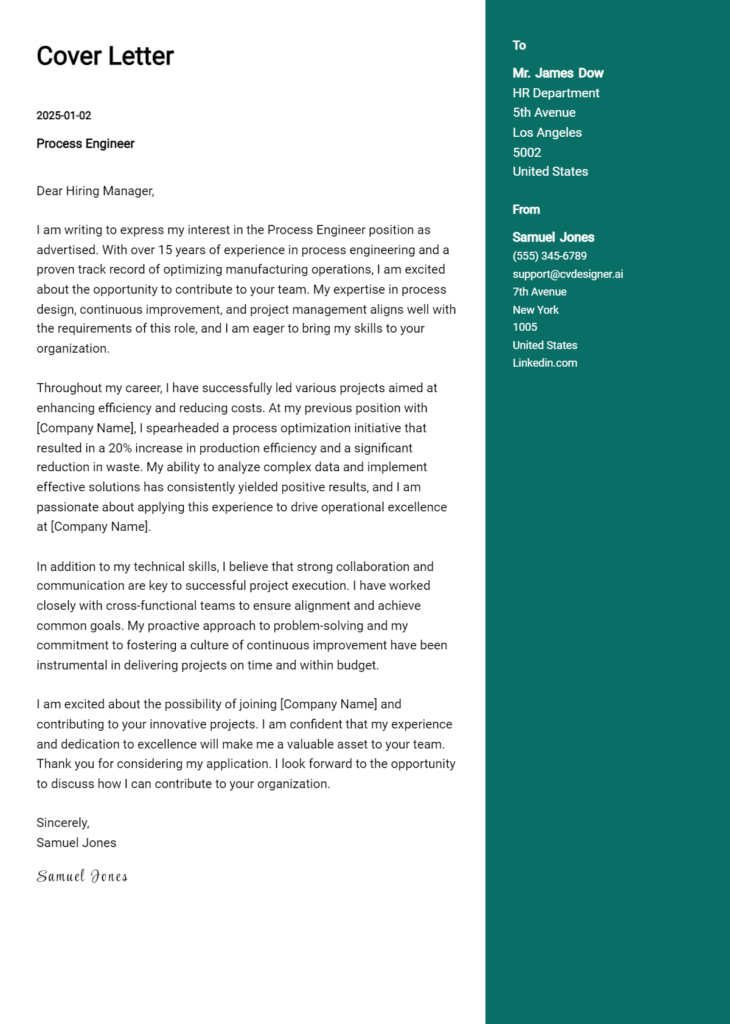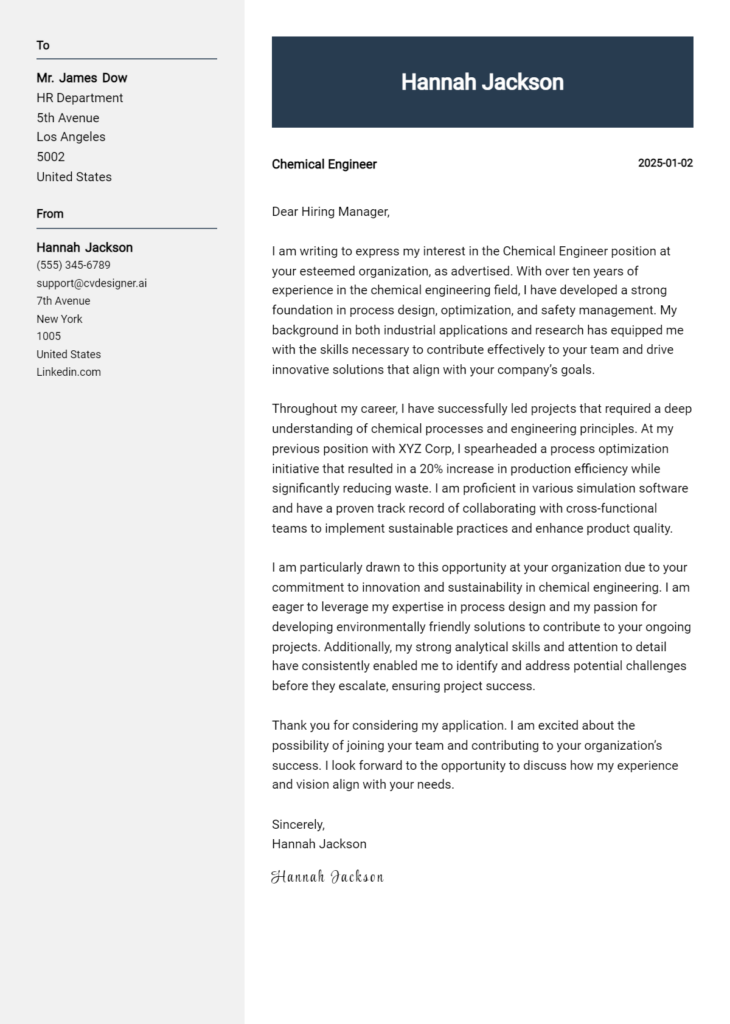Pharmaceutical Engineer Cover Letter Examples
Explore additional Pharmaceutical Engineer cover letter samples and guides and see what works for your level of experience or role.
How to Format a Pharmaceutical Engineer Cover Letter?
Crafting an effective cover letter is essential for a Pharmaceutical Engineer, as it serves as your first opportunity to make a strong impression on potential employers. The way you format your cover letter not only highlights your technical skills and qualifications but also demonstrates your ability to communicate clearly and professionally—crucial attributes in the pharmaceutical industry. A well-structured cover letter captures the hiring manager's attention while reflecting your meticulous nature and commitment to quality, both of which are vital in ensuring compliance and safety in pharmaceutical engineering.
In this guide, we will explore how to structure your cover letter, providing insights and industry-specific examples to help you develop a persuasive document.
We’ll focus on the essential components of a professional cover letter, including:
- Cover Letter Header
- Cover Letter Greeting
- Cover Letter Introduction
- Cover Letter Body
- Cover Letter Closing
Each section is integral to showcasing your qualifications and professionalism. Let’s delve into each part and learn how to make your Pharmaceutical Engineer cover letter stand out.
Importance of the Cover Letter Header for a Pharmaceutical Engineer
The cover letter header is a crucial element of any job application, particularly for a Pharmaceutical Engineer, as it sets the tone for the entire document. A well-structured header conveys professionalism and attention to detail, qualities essential in the pharmaceutical industry. The header should include your contact information, the date, and the recipient's details, ensuring clarity and ease of communication. A clear and professional header not only reflects your organizational skills but also demonstrates your respect for the recipient's time.
Below are examples of a strong and weak cover letter header for a Pharmaceutical Engineer:
Strong Example
John Doe 123 Pharmaceutical Lane City, State, Zip Code johndoe@email.com (123) 456-7890 October 1, 2023 Dr. Jane Smith Hiring Manager Pharma Solutions Inc. 456 Industry Blvd City, State, Zip Code
Weak Example
johndoe@email.com 10/1/23 To Whom It May Concern
The Importance of the Cover Letter Greeting
The greeting of a cover letter plays a crucial role in establishing the tone for the entire communication. A well-crafted greeting not only demonstrates professionalism but also adds a personal touch by directly addressing the hiring manager. This initial connection can set the stage for a positive impression and show that you have taken the time to research the company and its personnel. To enhance the effectiveness of your greeting, it’s important to avoid generic salutations like "To Whom It May Concern." Instead, take the time to find out the name of the hiring manager, which signals your genuine interest in the role and the organization. If you cannot find the name through the company website or LinkedIn, consider calling the company’s front desk for assistance.
Here are examples of strong and weak greetings for a Pharmaceutical Engineer cover letter:
Strong Greeting Example
Dear Dr. Jane Smith,
Weak Greeting Example
To Whom It May Concern,
The Importance of a Strong Cover Letter Introduction for a Pharmaceutical Engineer
Crafting an engaging introduction for a Pharmaceutical Engineer cover letter is vital, as it serves as the first impression to the hiring manager. A well-crafted introduction not only captures attention but also conveys the candidate’s enthusiasm for the role and showcases relevant skills or achievements. A strong introduction can set the tone for the rest of the letter, making the candidate stand out in a competitive field, whereas a weak introduction may fail to convey the candidate's qualifications and interest, risking dismissal from consideration.
Strong Example
Dear Hiring Manager, As a dedicated Pharmaceutical Engineer with over five years of experience in drug formulation and process optimization, I am excited about the opportunity to contribute to [Company Name]. My passion for advancing pharmaceutical technologies, coupled with my proven track record of successful project management and regulatory compliance, positions me as a strong candidate for this role. I am eager to bring my expertise in innovative solutions and quality assurance to your esteemed team.
Weak Example
To whom it may concern, I am writing to apply for the Pharmaceutical Engineer position. I have some experience in the field and think I could do the job. I hope you will consider my application.
Purpose of the Cover Letter Body for a Pharmaceutical Engineer
The cover letter body for a Pharmaceutical Engineer serves as a vital opportunity for candidates to articulate their unique qualifications, relevant experiences, and the value they bring to the prospective employer. This section should effectively highlight specific projects or accomplishments that demonstrate the candidate’s technical expertise and problem-solving abilities within the pharmaceutical industry. By showcasing successful initiatives, such as leading a process optimization project that resulted in a 20% reduction in production costs, the candidate can convey their capacity to contribute positively to the organization’s goals. A well-crafted cover letter body ultimately distinguishes the candidate from others by providing a personalized narrative that aligns their skills with the company’s mission and needs.
Strong Example
Dear Hiring Manager, I am excited to apply for the Pharmaceutical Engineer position at XYZ Corporation. In my previous role at ABC Pharmaceuticals, I successfully led a cross-functional team in the development and implementation of a novel drug delivery system, which improved bioavailability by 30%. This project not only enhanced product performance but also reduced time-to-market by six months. My hands-on experience with process validation and regulatory compliance has equipped me with the skills to navigate complex challenges in pharmaceutical manufacturing. I am eager to bring my expertise in Lean Six Sigma methodologies to your team, driving efficiency and innovation in product development. Sincerely, [Your Name]
Weak Example
Dear Hiring Manager, I am applying for the Pharmaceutical Engineer position at XYZ Corporation. I have worked in the pharmaceutical industry for a while and have some experience with different projects. I believe I can bring value to the team. I have done some work with drug formulations and have a good understanding of the processes. I hope to contribute to your company. Best, [Your Name]
Importance of the Cover Letter Closing for a Pharmaceutical Engineer
The closing paragraph of a cover letter for a Pharmaceutical Engineer is crucial as it serves to summarize the candidate's qualifications, reiterate their enthusiasm for the position, and encourage the hiring manager to take the next steps in the hiring process. A strong closing leaves a lasting impression and reinforces the applicant's suitability for the role, while a weak closing can diminish the impact of the entire letter. Here are examples of both:
Strong Example
Thank you for considering my application for the Pharmaceutical Engineer position. With my extensive background in process optimization and my commitment to advancing pharmaceutical manufacturing practices, I am excited about the opportunity to contribute to your team. I look forward to the possibility of discussing my qualifications further and would welcome the chance to interview at your convenience. Please find my resume attached for your review.
Weak Example
I hope you think about my application. I have some experience in pharmaceutical engineering, and I guess it could be useful. If you want, you can check my resume. Thanks.
Crafting an effective cover letter for a Pharmaceutical Engineer position requires a strategic approach that highlights your technical skills, problem-solving abilities, knowledge of Software Development Life Cycle (SDLC), teamwork, and a passion for continuous learning. This document serves as your opportunity to showcase not only your qualifications but also your enthusiasm for the role and the industry. Below are some tips to help you create a compelling cover letter that stands out.
Tips for Writing a Pharmaceutical Engineer Cover Letter
Highlight Technical Skills
Emphasize your technical expertise relevant to pharmaceutical engineering, such as knowledge of regulatory standards, analytical techniques, or proficiency in software used for simulation and modeling. Be specific about your skills and how they align with the job requirements. This shows potential employers that you have the foundational knowledge necessary for the role.Showcase Problem-Solving Abilities
Provide examples of how you have successfully tackled challenges in previous roles or projects. Describe a specific problem you faced, the steps you took to resolve it, and the outcome. This not only demonstrates your analytical skills but also your ability to apply theoretical knowledge to real-world situations.Demonstrate SDLC Knowledge
If your experience includes working within a Software Development Life Cycle, mention it explicitly. Detail how you have contributed to different phases of the SDLC, such as requirements gathering, design, implementation, or testing. This knowledge is crucial in pharmaceutical engineering, especially in the development of software for drug manufacturing or clinical trials.Emphasize Teamwork and Collaboration
Pharmaceutical engineering often requires collaboration with cross-functional teams. Share instances where you successfully worked with others, highlighting your role in achieving common goals. Mention any collaborative projects that resulted in improved processes or innovative solutions, showcasing your interpersonal skills and ability to work in diverse teams.Express a Commitment to Continuous Learning
The pharmaceutical industry is ever-evolving, making it essential to stay updated with the latest advancements and technologies. Discuss any relevant certifications, courses, or professional development activities you are pursuing or have completed. This conveys your proactive approach to personal and professional growth, making you a valuable asset to any organization.
For additional assistance in crafting your cover letter, consider utilizing cover letter templates or a cover letter builder to streamline the process and ensure your document is polished and professional.
Common Mistakes to Avoid in a Pharmaceutical Engineer Cover Letter
Crafting an effective cover letter is essential for securing a position as a Pharmaceutical Engineer. Avoiding common mistakes can significantly enhance your chances of making a positive impression. Here are some pitfalls to watch out for:
Generic Content: Tailoring your cover letter to the specific job and company is crucial. Avoid using a one-size-fits-all approach. Research the company and mention specific projects or values that resonate with you.
Ignoring Formatting: Poorly formatted cover letters can distract from your qualifications. Adhering to a professional cover letter format is key to ensuring clarity and readability.
Overloading with Technical Jargon: While it's important to highlight your technical skills, using excessive jargon can alienate the reader. Aim for a balance by explaining complex concepts in simple terms.
Neglecting Soft Skills: Focusing solely on technical expertise can be a mistake. Pharmaceutical engineering also requires strong communication and teamwork skills, so be sure to highlight these attributes.
Lack of Specific Examples: Failing to provide concrete examples of your achievements may weaken your case. Use specific metrics and outcomes to illustrate your contributions in previous roles.
Typos and Grammatical Errors: Such mistakes can undermine your professionalism. Always proofread your cover letter or consider using tools for error detection.
Not Including a Call to Action: Concluding your cover letter without a call to action can make it less impactful. Encourage the reader to follow up or mention your eagerness for an interview to leave a lasting impression.
For more insights, you can explore cover letter examples that showcase effective strategies and formats.
Cover Letter FAQs for Pharmaceutical Engineer
What should I include in my cover letter as a Pharmaceutical Engineer?
In your cover letter, you should include key elements such as your contact information, the date, and the employer’s contact details. Start with a strong opening that captures the reader's attention, followed by a brief introduction about yourself and your interest in the position. Highlight your relevant experience in pharmaceutical engineering, such as specific projects, technologies, or methodologies you've worked with. Address your understanding of the company's mission and how your skills align with their goals. Finally, express enthusiasm for the opportunity and a desire for further discussion in an interview.
How can I showcase my technical skills in the cover letter?
To effectively showcase your technical skills, be specific about the tools, technologies, and methodologies you are proficient in. For example, mention your experience with process validation, Good Manufacturing Practices (GMP), and regulatory compliance. Use quantifiable achievements to demonstrate how these skills contributed to project success or improved efficiency. Instead of merely listing skills, provide context by describing a relevant project where you applied these skills. This approach not only highlights your technical capabilities but also illustrates how you can add value to the prospective employer's team.
Should I tailor my cover letter for each job application?
Yes, tailoring your cover letter for each job application is essential. A customized cover letter demonstrates your genuine interest in the specific role and company, which can set you apart from other candidates. Research the company’s values, culture, and recent projects to align your skills and experiences with their needs. Mention specific aspects of the job description that resonate with your expertise, and address how your background makes you a perfect fit for their team. This level of personalization can significantly enhance your chances of being noticed by hiring managers.
How long should my cover letter be?
Your cover letter should ideally be one page long, consisting of three to four paragraphs. Aim for a concise yet informative format that captures the reader's attention without overwhelming them with information. Each paragraph should serve a specific purpose: an introduction to who you are, a detailed account of your relevant experiences and skills, and a closing statement expressing your enthusiasm for the role. Keeping it succinct ensures that hiring managers can quickly grasp your qualifications and interest, increasing the likelihood of your application being considered.
Build your Cover Letter in minutes
Use an AI-powered cover letter builder and have your letter done in 5 minutes. Just select your template and our software will guide you through the process.

